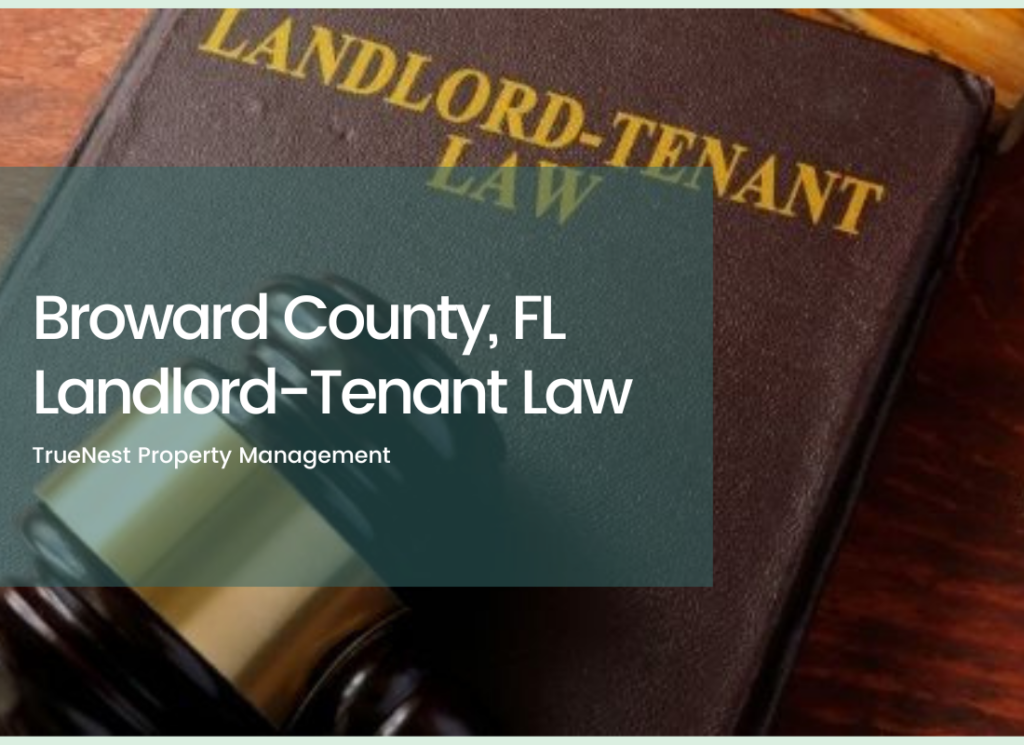Florida Rental Laws – An Overview of Landlord-Tenant Rights in Broward County

According to Census ACS data, over 30% of households in Florida are renter-occupied, meaning it is one of the highest renter populations in the country.
One of the reasons for this is that Florida, and Broward Country, in particular, is very real estate investor friendly with no legal restrictions on late fees and no rent control regulations in place that would govern the rental agreement.
TrueNest has put together this article to give all Florida landlords, whether they run a single-family home or duplex or otherwise, an understanding of the laws in this state.

Required Landlord Disclosures in Florida
Under Chapter 83 of the Florida Statute, certain aspects of the rental unit must be disclosed on the written agreement if they are renting an applicable building. The following are some examples:
- Lead-based Paint: If your home was built before 1978, federal law requires any Florida landlord to provide their Florida tenant with information regarding lead-based paint hazards.
- Radon Gas: Under, Florida law landlords are required to give their renters information regarding radon gas. Regardless of whether it’s present in or near your dwelling unit.
- Security Deposit Details: There are certain details that you must let your tenant know regarding the storage of their deposit. For instance, the interest amount and how you’re storing the deposit.
- Landlord’s Details: You must let your tenant know of the property owner’s identity, as well as any other person authorized to act on your behalf.
Rights & Responsibilities of Tenants in Florida
As per Florida law, tenants have many rights regarding their rental property. These rights include:
- Living in rental premises that abide by all relevant housing and health codes at both the state and local levels.
- To live in peace and quiet, away from any unnecessary disruptions caused by either the landlord or other neighbors.
- The right to be served with notice prior to entry.
- To be served notice whenever the landlord is looking to make changes to the terms of the agreement.
- To have any repairs completed within a reasonable time (usually seven days).
- To have the ability to end the lease and rental period for certain legally justifiable reasons.
- Tenant rights also allow a Florida tenant to join a tenants’ union to advocate for their rights.
Those renting in Florida also have several tenant responsibilities, as per the Florida law:
- To allow a landlord reasonable access to their premises for them to carry out important duties.
- To pay rent in a timely manner. As an aside, if a tenant looks to withhold their rent payment, they must give the landlord seven days’ notice that they may do so. This gives the landlord the opportunity to correct the error.
- To notify the landlord when a maintenance issue occurs. If the tenant fails to do so, it could cause
- To notify the landlord when looking to take an intended absence from the area for an extended period
- To serve proper tenant written notice to a landlord when looking to vacate the rental unit.

Rights & Responsibilities of Landlords in Florida
As per Florida Landlord-Tenant Law, a lease agreement also affords a Florida landlord several legal rights:
- To enter rental properties to carry out important obligations, such as inspecting the rental unit.
- The ability to terminate the tenancy for violations of the written rental agreement.
- Enforce the terms of the lease agreement. For example, charge a late fee for overdue periodic rental payments.
- Require a tenant to pay a security deposit prior to moving in.
- The ability to make changes to the terms of the rental agreement if notice is served.
- They must be served proper notice by a tenant who is leaving their rented premises.
- To receive rental payments as per the existing rental agreement.
A Florida residential landlord also has a series of landlord responsibilities under Florida law. Some are as follows:
- Treat residents equally and as per the Florida laws and fair housing act.
- To give the tenant reasonable notice when they look to enter the dwelling unit.
- Provide renters with a habitable dwelling that is compliant with housing and health codes.
- Respond to maintenance issues when they pop up and give the tenant notice on timescales for repair.
- Abide by the security deposit rules as per rental agreements and Florida laws. If a landlord fails to do so, they may leave themselves liable.
An Overview of the Landlord-Tenant Laws in Florida
Renter’s Rights for Repairs
All landlords in Florida have the responsibility to maintain and repair any amenities they provide to their residents. For example, if you provide an air conditioning unit and it breaks, the responsibility to repair it is the landlord.
It’s also important that any repairs are made as quickly as possible to maintain your landlord-tenant relationship. In Florida, landlords have exactly seven days to make the repairs once they’ve been notified or the tenant can begin withholding rent payments that would normally be paid monthly.
If a landlord fails to perform the repairs give a tenant several options. Including, the right to withhold rent or to make the repairs and deduct the costs from further rent payments.

Tenant Eviction
Landlords have a right to contact a county court to evict a tenant under certain circumstances as per Florida landlord-tenant laws. Common reasons include:
- Nonpayment of rent: Under Florida rental laws, if a tenant fails to pay rent then this becomes a gross violation of the rental agreement. This also applies if the rent payment is late frequently. To begin the eviction process, you must send the tenant a 3-Day Notice to Pay as per Florida statutes.
- Failure to vacate the premises after the rental agreement has expired: This type of lease violation comes in 3 varieties. So, the type of notice to serve such tenants depends on the length of tenancy. For renters on a weekly written lease, you must send them a written notice called a 7-Day Notice to Quit. For renters on a monthly lease, you must serve them a 15-Day Notice to Quit. For renters on an annual lease, you must serve them such notice as a 60-Day Notice to Quit.
- Violation of the rental agreement: Examples of common violations include keeping an unauthorized pet or illegal subletting of the dwelling unit. In such cases, you must serve the tenant a written notice called a 7-Day Notice to Cure. If the remaining commits a violation but doesn’t rectify it or moves out of the premises after the landlord’s written notice period, you may then get a court order and incur court costs.
Any other eviction process or method of recovering possession of the dwelling aside from the one prescribed in Florida law is illegal. An example of such an eviction process is locking your tenant out of their rental property.
Security Deposits in Florida
Also contained in the statewide landlord-tenant act are the Florida security deposit laws. You must abide by these laws when it comes to handling your renter’s deposits.
For example, when it comes to returning the security deposit, Florida law dictates you must do so within 15 days after the renter moves out. If you wrongfully withhold it, you risk forfeiting any right to make any deductions.
A Florida landlord shall also make deductions from security deposits for things like the removal of the tenant’s personal property after the rental agreement ends or to recover unpaid rent.
Early Lease Termination
Generally, renters who sign an agreement intend to stay in the rental unit for its length. But this is not always the case, life can happen, and a renter may wish to terminate the rental agreement.
As per Florida state law, a renter can break the lease without penalty for any of the following reasons:
- A habitability violation.
- Relocation for active military duty or state active duty.
- Lease violation.
- Landlord harassment.
- A privacy violation.

Housing Discrimination
Any form of housing discrimination in Florida is illegal as per the Fair Housing federal laws. Protected characteristics for Florida tenants under the act include race, color, national origin, and familial status. So, any landlord that discriminates against their residents open themselves up for legal action.
Bottom Line
It is important for both the landlord operating in Florida to fully understand the landlord-tenant laws.
A landlord must create fair and equitable lease agreements and abide by them under these laws, so if you have any questions it’s regarding eviction notices, the Florida Fair Housing Act, applicable building codes, Florida statutes, or anything else, it’s best to consult a real estate management company.
TrueNest Management is here to help you, so contact us today!
Disclaimer: This blog isn’t a substitute for professional legal advice. Laws do change and this information may not be updated at the time you read it. If you have a specific question, kindly get in touch with a qualified attorney or an experienced real estate management company.
